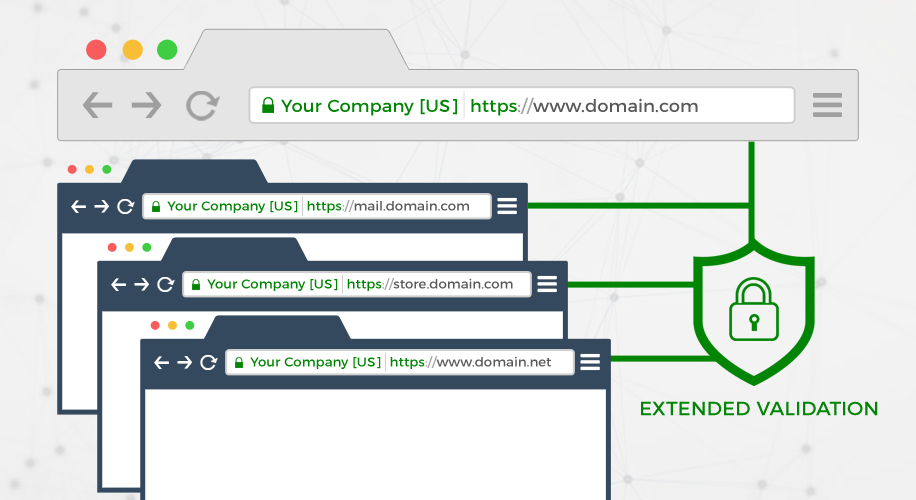
Today, Internet users have been more worried than before about the security of their data present on the websites. The main reason behind their worry is the increasing number of data breaches and cyberattacks that have been taking place in the Internet arena. A lot of data is often compromised and this is the reason why users are losing trust in their data security providers. This increased demand for data security on the websites has resulted in stronger data encryption techniques like SSL or Secure Sockets Layer.
HTTPS and SSL
While browsing on the Internet, you must have noticed that most of the websites’ URL now begins with an https:// rather http://. This might look like a small distinction but the difference between http:// and https:// is quite significant. So, to understand the difference between these two, let’s analyze what communication protocols are. The communication protocols enable transferring of information from the website’s server to the visitor’s browser. HTTP was a default option used for a long period, however, HTTPS is a safer protocol that helps in encryption of data on the Internet. Today, HTTPS is increasingly being used by almost all websites. The benefits of using HTTPS is that it reduces the risk of corrupt users intercepting and misusing sensitive data. So, to deploy the usage of HTTPS on the user website, one needs to install an SSL certificate on their website.
What Exactly is SSL?

SSL or Secure Sockets Layer is a networking protocol designed to secure the connections taking place between the web clients and web servers over an insecure network. SSL certificate allows the web servers to provide a secure online transaction taking place between the customers and businesses. Owing to a number of protocols and shortcomings in their implementations along with vulnerabilities has been depreciated for its usage over the Internet. In the year 2015, SSL certificates were replaced by the Transport Layer Security or TLS.
Working of SSL
In the SSL protocol, there are two sub-protocols, namely- record protocol and handshake protocol.

Working of SSL
The record protocol specifies the way in which communication takes place between different hosts for exchanging data with the help of SSL. The record protocol does include the specifications related to how data has to be prepared for transmission and how it is going to be verified when it will be received at the recipient end.
The handshake protocol is responsible for assigning how the web clients and web servers will establish the SSL connections, including the negotiation of the cryptographic systems that are going to host each other.
Types of SSL Certificates
The different types of SSL certificates differ on the basis of how they’re validated and hence, every type of SSL certificate needs a different procedure for its approval. The organization that is responsible for providing approval is known as a Certificate Authority (CA).
A Certificate Authority provides three levels of validation of SSL certificates, namely- Domain Validation, Organization Validation, and Extended Validation.
Domain Validation (DV) Certificates
The domain validated SSL certificates are the most basic ones. They are responsible for securing the server-browser communication only. Usually, the CA performs the validation by the means of an email or by going through the Domain Name System record for the user website.
The best advantage of using a domain validation certificate is that it is simple and quick and can be obtained within no time.
However, in terms of security, the domain validated certificates offer the least security. Users get the idea that their information is encrypted. Some web browsers even display sites having a domain validated certificate by depicting a gray warning symbol placed next to the URL.
Organization Validation (OV) Certificates
These types of SSL certificates offer a relatively higher degree of assurance and security as compared to domain validation certificates. To get an organization validation certificate, the Certificate Authority investigates the user website. The minimum criteria needed to get an organization validation certificate is that the organization needs to be legitimate.
An organization validated certificate is an expensive option as compared to a domain validated one. If the user has an e-commerce website or any other portals, then an organization validated certificate might not be the right option for them.
Extended Validation (EV) Certificates
The extended validated certificates deploy the strictest approval process. Before assigning these certificates, the Certificate Authority performs an in-depth investigation of the business and will look for details like- the existence of the organization, its legal status, domain names, etc. In the monetary terms, these certificates are the most expensive option.
Talking about security, these SSL certificates have the highest level of security offerings. Also, one of the major advantages of using the EV certificates is that trust is gained easily amongst the users that their information is safe and used with care.
Most of the browsers will depict that the user connection is secure. EV certificates are recommended for websites that handle user’s personal data such as banking pages.
Conclusion:
On a concluding note, I would say irrespective of the type of website that you have, it is important for you to make sure your connections are secure. Providing a secure website is one of the best ways to build trust in your users. Depending on your business, you need to select the right type of SSL certificate out of the ones discussed in the article.

